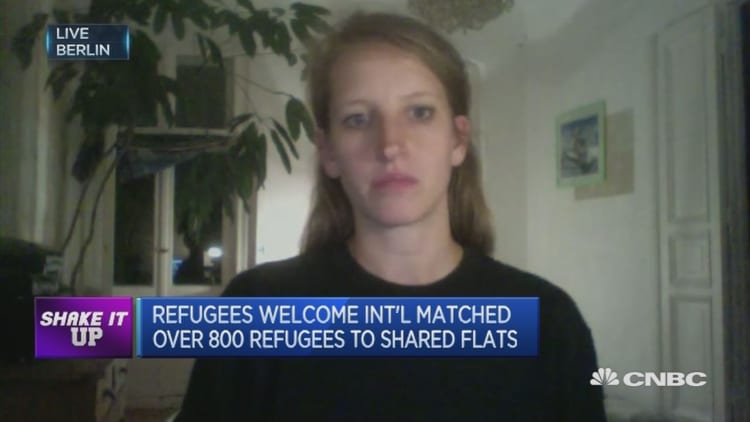
One non-profit organization has aimed the sharing economy's methods at two main concerns of Europe's refugee crisis: Where to house the refugees and how to assimilate them into the host country's culture.
Since its start in 2014 in Germany, Refugees Welcome, which has since expanded to nine other countries, has matched 811 asylum-seekers with hosts with rooms and helping them adapt to the new country.
But with United Nations High Commissioner for Refugees (UNHCR) data showing more than a million migrants pouring into Europe last year alone, the demand for rooms obviously outweighed supply.
"We have over 10,000 [refugee] applications in Germany, and of course a lot less offers for rooms," said Mareike Geiling, co-founder of Refugees Welcome, in a CNBC interview.
It's not just a lack of rooms that slows the non-profit's progress: Matches can't be made willy-nilly.
Geiling said hosts and refugees must be screened, with the process including questions about background, origin country, age and spoken languages. Most crucially, she added, the refugees and hosts must meet in person to cement the fit.
And if the usual problems that come with cohabiting arise, Refugees Welcome recommended on its website that "the same rules apply as with any other flatmate - you try and find a solution," adding "if needed, with our assistance."
But there's another headwind to a successful match: Overcoming reservations and prejudices against refugees.
"Last year in September was the highest point of registration for rooms, but we think because of the attacks in Paris and in Cologne, the registration for rooms declined a lot. We still have some 50 to 80 registrations per month, but it's not comparable to last year," Geiling said.
A Pew Research Center report released in July found that more than half of the eight European nations surveyed believe that incoming refugees will increase the likelihood of terrorism in their country.
The refugee issue has also featured prominently in the anti-immigrant rhetoric of right-wing parties across Europe, reported Pew Research Center. Indeed, it was considered one of the major drivers of the late-June U.K. vote to exit the European Union.
Still, Geiling said she wasn't disheartened by negative public sentiment.
"[For] people interested in our [organization], they know that there is not a big difference if you live with a Syrian, or with a French or Swedish person. We're all just human beings looking for a room," she said.

